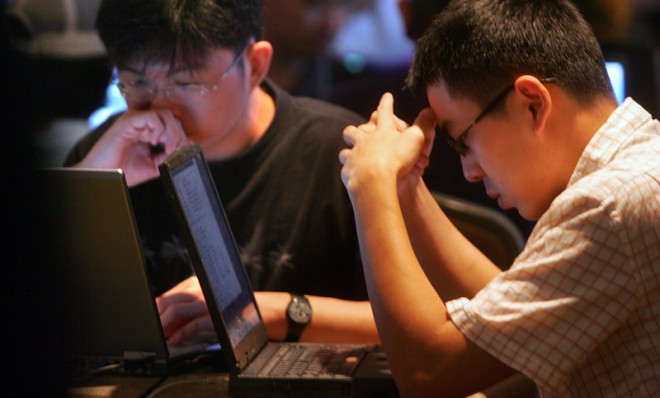China's surprisingly open hacking culture
A hacker freelancing for a privately owned company can earn up to $100,000 a year overseas

A free daily email with the biggest news stories of the day – and the best features from TheWeek.com
You are now subscribed
Your newsletter sign-up was successful
Although the notion has been proved laughably wrong on more than one occasion, in the U.S., the term "hacker" can still conjure up shadowy images of cyberpunk wizards pressing keys in front of glowing terminals. That's not the case at all, though, at least not in China. The loose categorical term "hacking" is treated with surprising levity, whether it's recording your neighbor's keystrokes, or hiring freelancers to hack a rival businesses' network to steal a peek at their financials.
According to The New York Times, "the culture of hacking in China is not confined to top-secret military compounds where hackers carry out orders to pilfer data from foreign governments and corporations." Instead, the practice is commonplace, openly discussed "at trade shows, inside university classrooms and on internet forums."
The Ministry of Education and Chinese universities, for instance, join companies in sponsoring hacking competitions that army talent scouts attend, though "the standards can be mediocre," said a cyber-security expert who works for a government institute and handed out awards at a 2010 competition.
Corporations employ freelance hackers to spy on competitors. In an interview, a former hacker confirmed recent official news reports that one of China's largest makers of construction equipment had committed cyber-espionage against a rival. [New York Times]
The Times suggests that hacking can be something of a lucrative — and perhaps viable — career in China, even if you don't want to work for the government. For the right privately owned company, a computer wizard can use his or her skills to earn $100,000 a year.
The Week
Escape your echo chamber. Get the facts behind the news, plus analysis from multiple perspectives.

Sign up for The Week's Free Newsletters
From our morning news briefing to a weekly Good News Newsletter, get the best of The Week delivered directly to your inbox.
From our morning news briefing to a weekly Good News Newsletter, get the best of The Week delivered directly to your inbox.
Yet China's relaxed attitude toward cyber-espionage could partially explain why U.S. companies have been the targets of a growing number of hacks from overseas. Earlier this year, The New York Times fell victim to a critical infrastructure breach, which security experts traced back to Shanghai and the People's Liberation Army, which was purportedly gathering intel regarding a Times story set to be published about top-ranking Chinese officials.
Indeed, the threat of cyber-warfare is a growing concern domestically. Out of fear of an imminent, serious cyber-attack — or perhaps one that's already underway — The Verge reports that a former group of government officials and private executives are calling on Congress to "consider passing laws allowing U.S. companies to 'counterattack' against such hackers, whoever they may be."
The controversial idea of giving U.S. companies legal protections to "hack back" against intruders on their networks has been proposed before by some legal experts and companies, and some companies are even alleged to already be engaging in the practice, despite the fact that there is no legal framework in the U.S. permitting it. But the new recommendations from Huntsman's group may be the highest-profile yet, as they come from former Obama Administration officials. [Verge]
To its credit, "China has said that its government is not the hack-happy entity that the U.S. says it is," CNET notes. In fact, Chinese officials claim that the "U.S. and other foreign governments have made attempts to hack into [China's] systems and networks." It seems the hacking goes both ways.
A free daily email with the biggest news stories of the day – and the best features from TheWeek.com
-
 Political cartoons for February 18
Political cartoons for February 18Cartoons Wednesday’s political cartoons include the DOW, human replacement, and more
-
 The best music tours to book in 2026
The best music tours to book in 2026The Week Recommends Must-see live shows to catch this year from Lily Allen to Florence + The Machine
-
 Gisèle Pelicot’s ‘extraordinarily courageous’ memoir is a ‘compelling’ read
Gisèle Pelicot’s ‘extraordinarily courageous’ memoir is a ‘compelling’ readIn the Spotlight A Hymn to Life is a ‘riveting’ account of Pelicot’s ordeal and a ‘rousing feminist manifesto’